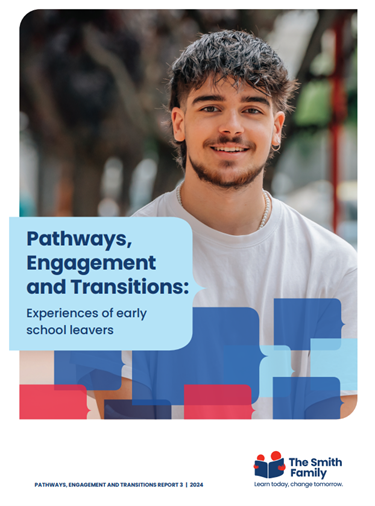
Pathways, engagement and transitions: experience of early school leavers
Over the last decade, school completion rates in Australia have seen at least one in five young people not finish Year 12. In 2022, as life returned to something more normal after the COVID pandemic, the completion rate dropped further, with a quarter of young people leaving school without finishing Year 12.
Research shows educational attainment is associated with positive social and economic outcomes across a person’s life and that those who leave school without completing Year 12 can find the post-school transition difficult.
With nine in 10 new jobs expected to require post-secondary qualifications, understanding the transition from school to study, training or work and supporting more young people to complete Year 12, is essential.
68% of the young people surveyed completed Year 12, while 28% left school early and 4% were still completing school in 2023. Of the students who started Year 11 but did not complete school, 92% said they had intended to finish Year 12.
Young people identified a number of reasons for leaving school early, involving both ‘push’ and ‘pull’ factors. The research found that school attendance and achievement in Maths and English in middle secondary school are key predictors of early school leaving, more so than demographic characteristics such as gender or location. This means that students who are at risk of leaving school, can often be identified early, and provided with additional support to help them finish Year 12. The findings also reinforced the important role high quality careers advice and support plays in helping young people complete school and the relationship between Year 12 completion and post-school engagement with work and/or study.
KEY FINDINGS
- 28% of respondents left school before completing Year 12.
- 92% of student who started Year 11 but didn’t complete school had intended to finish Year 12.
- 57% of students who had poor attendance in Year 9 (less than 70%) left school before finishing Year 12.
- 39% of students who couldn’t recall careers advice left school early.
- In 2022, 70% of young people were working, up from 55% in 2021 and 48% were studying in 2022, down from 52% in 2021.
- Students who left school early due to ‘pull’ factors (wanting to get a job, apprenticeship or training) generally had better post-school outcomes than students who left school due to ‘push’ factors (health or mental health issues, struggling academically, bullying, not liking school).

Why do young people leave school?
The reasons young people leave school early are complex, and over half of early school leavers identified there were multiple reasons. The research identified a number of ‘push’ and ‘pull’ factors which contributed to students’ decisions to leave school.
Push factors included:
- Not liking school (32%)
- Health or mental health issues (31%)
- Not doing well at school or missed a lot of school (28%)
- Having problems with students or teachers or being asked to leave (17%)
- Being bullied at school (13%)
Note: Students could identify multiple reasons
“School wasn’t for me, I dropped out so I could become an apprentice and get something under my name, get some qualifications.” – George (early school leaver)
“I was bullied through school, so I left. I still wanted to finish some sort of schooling, so I did Year 10 and Year 11 at TAFE.” – Jen (early school leaver)
“I was not in the right place last year. I struggled with school a lot. I was just in a really, really bad mental space.” – Paige (early school leaver)
Pull factors:
- Wanting to get a job, apprenticeship or traineeship (31%)
- Getting a job/apprenticeship/traineeship (26%)
- Wanting to do other training or courses (16%)
“I was going to do Year 12 but I found the job. School wasn’t for me, I dropped out so I could become an apprentice and get so, so I didn’t feel the need to do Year 12. I’m out of school now … I’m doing a security course and then the next step is an electrical apprenticeship.” – Iqbal (early school leaver)
Students who left school early because of push factors generally had less positive post-school pathways in terms of work and study, whereas students who experienced pull factors generally had more positive outcomes.
Post-school engagement in work and/or study
The research confirms the link between post-school engagement in work and/or study and Year 12 completion. Young people are defined as being fully engaged if they are working and/or studying for 35 hours a week or more.
- Early school leavers were less likely to be fully engaged (38%) than Year 12 completers (52%).
- Early school leavers were more likely to be not engaged (33%) in the labour force or education compared to Year 12 completers (24%).

Experiences with post-school work
A high proportion of young people (around 3 in 5) had changed jobs between 2022 and 2023, with a similar proportion of early school leavers (61%) and Year 12 completers (64%).
However, early school leavers were less likely to leave a job by choice (76%) than students that finished Year 12 (87%). Early school leavers who were in work but hadn’t completed an apprenticeship/traineeship tended to be in low skilled roles. The data suggests they were working in more precarious employment than Year 12 completers, and often with limited opportunities for career progression.
" I got made redundant and got a little bit of a payout from it. I got a new job straight away, same pay and everything, so it was going well but the company I’m working for now isn’t very good. They’ve cut back my hours and messed me around a bit. " – Liam (early school leaver)
Experiences with post-school study
Around half (46%) of all young people who completed Year 12 were engaged in study in 2023, compared to a third (32%) of early school leavers. While one in five early school leavers had completed a qualification in 2023, 28 percent had left a course without completing it since the 2022 survey.
Among early school leavers:
- Reasons for leaving a course included personal reasons (32%), not the course they wanted (28%), lost interest (21%), problems juggling study and family commitments (21%), wanted to get a job, apprenticeship or traineeship (21%), and financially couldn’t afford it (13%)

Early school leavers’ perceptions and experiences
Overall, early school leavers were happy about having left school early (73%). However, this was closely tied to their level of engagement in post-school work or study.
• 77% of early leavers who were fully engaged were happy or very happy.
"I’m happy with where my life is at the moment." – Sienna (early school leaver)
"I’m not where I wanted to be this time last year, but I think, considering the setbacks I’ve had, I’m starting to get back on track." – Heath (Year 12 completer)
• However, just 34% of early leavers who were not in the workforce or education described themselves as happy or very happy.
"Sometimes I just feel like a burden. It’s felt like an endless cycle of having to work, being so depressed and disconnected, but I have to do that because I’ve got to pay rent and eat food. It just gives you a really dark view about life." – Angela (early school leaver)
Financial concerns were also common among young people, with the cost of education sometimes a mitigating factor when it came to post-school study.
• 44% of early school leavers said they worried often or all the time about paying for essentials compared with 34% of students who completed Year 12.
"I don’t have enough money to buy groceries. I’m waiting until I get paid next, and I’m not eating properly." – Angela (early school leaver)
" Financially it’s a bit tough at the moment. I still live at home with Mum and Dad, it’s cheaper than renting... My income is quite low, and most of it goes on bills. There’s been a few pays where I was a bit short, struggling to make ends meet. I got through it, just had to live a little bit tighter at times." – Liam (early school leaver)
• 13% of early school leavers said they left post-school study because they couldn’t afford to continue.
"I’m not really sure when I’ll be doing that sort of study especially because money wise, it costs quite a bit, a university course." – Angela (early school leaver)
Factors affecting outcomes in the senior secondary and post-school years
Young people cited a number of issues that affected their senior secondary and post-school outcomes.
• the impact of COVID-related school closures in 2020 and 2021
"I couldn’t go to school because we were in lockdown and I couldn’t get the work done, because my computer is really bad. I had to get workbooks, but I couldn’t do the workbooks because I didn’t have anyone helping me and it was just a lot and I just couldn’t do it. So, I pretty much just gave up that year and was like, this is pretty much a chunk of my life that I’m not going to get back and I will need to try again next year." – Heather (early school leaver)
• learning challenges and limited personalised learning options
"I feel like they should work around people, you know? Everyone has different preferences, and if you want people to actually enjoy learning, you have to go out of your way to make it enjoyable… It would be nice to have some alternatives, like one-on-ones." – Holly (early school leaver)
• mental health issues and lack of access to support
"They need to start listening to the people that have mental disabilities, physical disabilities. School works for some people, but others struggle very, very much – Heather (early school leaver)
They’ve got counsellors and stuff like that, but a lot of people are too scared to use it, they need to make it more of a comfortable setting." – Sam (early school leaver)

Support to help plan for post-school
Young people recognised that appropriate support, both in school and out of school, was needed to help them plan for post-school. Issues raised included:
• personalised support at school, including to develop the skills needed for post-school life and to explore career options.
"The work is hard to understand sometimes cos they’re going at a very fast pace. I know it’s hard to help individuals, but they need to do that cos we’re not going to understand if it’s just thrown at us." – Heather (early school leaver)
" Teach us how to be in the real world. I don’t know how to do taxes; I didn’t know how to write a résumé; I didn’t know how to do a cover letter; didn’t know how to apply for a job." – Heath (Year 12 completer)
"Just having people understand what the goal is and why. And then actually helping them create – make a path. Like steps to get there. I had none of that and it would have been nice to know, oh, maybe we should do an instructor course or maybe we should do this course, and then I can go here and do that. I think you’ve got to have a plan with a goal, not just a goal." – Rosie (early school leaver)
"I think it could be more useful to explore different avenues with young people; spend more time talking about the future and what they actually want to do. I think that would definitely help." – Liam (early school leaver)
"I want to become a police officer. My careers counsellor gave me two options. Either I finish Year 12 and go to uni to do legal studies, or get an apprenticeship qualification and go through recruitment and sign up. So, that’s what I’m doing right now. My careers advisor did everything for me organising the apprenticeship." – George (early school leaver)
"We had meetings with the careers counsellor at our school and they would ask us what course we wanted to go into or what job we wanted to do in the future, and advise us on what uni to go to and what ATAR would be required. They also showed me the different pathways in case I didn’t get a high enough ATAR. I could have gotten a Diploma, Advanced Diploma, and so on. At first I had doubts I would get into the course I wanted, but that conversation helped set my mind at ease. It was very helpful." – Ali (Year 12 completer)
• Transport costs and the cost of further study are significant barriers to successfully transitioning to the workforce and further education.
"I’m hoping in the near future to complete my Diploma of Beauty Therapy, but my main struggle is transportation. I don’t have a licence and I worry about public transport. I feel vulnerable being by myself on public transport." – Piper (Year 12 completer)
"I’m not really sure when I’ll be doing that sort of study especially because money wise, it costs quite a bit, a university course". – Angela (early school leaver)

Strengthening Year 12 completion and post-school outcomes of young people experiencing disadvantage
The insights from early school leavers and Year 12 completers through the PET surveys and interviews highlight several priorities for improving post-school work and study opportunities for young people experiencing disadvantage and supporting more of them to complete Year 12.
- Continuous monitoring of early warning signs to identify young people at elevated risk of early school leaving – lower attendance, achievement, mental health, bullying, social challenges.
- More individualised support while at school to strengthen school completion. This is a diverse group of young people that require tailored approaches.
- Individualised career advice and support through secondary years to help young people articulate post-school plans and steps to achieve them.
- Obtain a job (e.g. resume, interview skills)
- Manage money (e.g. budgeting, where to seek financial support)
- Thrive in tertiary education (e.g. time and study management skills)
- Obtain support post-school (e.g. where and how to seek support regarding pathways, study, mental health, work etc).
- Increase support and information to parents/carers/family members. These people are primary sources of advice so need to be adequately supported with up-to-date information on post-school pathways.
- Appropriate accessible support in and outside school for young people with mental health issues.

Study breakdown
This is the third PET publication and focuses on students who were in Year 10 in 2020 and left school before completing Year 12. It explores their engagement with school, work and further study, factors influencing their study and what more can be done to strengthen their post-school outcomes.
Over 2,000 young people responded to the three surveys (2021, 2022 and 2023) and 29 took part in in-depth interviews. Of those who took part:
- 55 percent are female and 45 percent are male
- 15 percent are from Aboriginal and Torres Strait Islander backgrounds.
- 30 percent live in non-metropolitan areas
- 40 percent have a health or mental health condition.
- All were from families experiencing disadvantage and were on The Smith Family’s long-term educational scholarship program, Learning for Life.
- Included young people from all states and territories.
i All names of young people have been changed.

